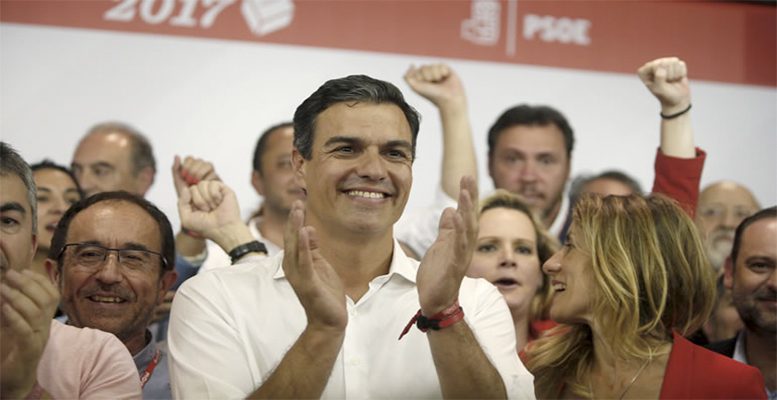It was the result Spain’s Socialist bigwigs had feared: a resounding victory for Pedro Sánchez in their party’s primary on Sunday, beating Andalusia premier Susana Díaz and former Basque premier Patxi López, to become leader for a second time.
Many had believed Sánchez was dead and buried last autumn, when his first spell as leader of the Spanish Socialist Worker’s Party (PSOE) ended in acrimony. His ouster had been triggered by two poor general election results, followed by a refusal to abstain in a parliamentary investiture vote in order to allow Mariano Rajoy to form a new conservative administration
But this has been one of the unlikeliest political resurrections Spain has seen, made possible by an equally unlikely makeover on the part of Sánchez.
In the summer of 2014, he emerged as a relatively unknown party moderate with orthodox economic policies to win that year’s leadership contest with the backing of the PSOE hierarchy. The young, telegenic university professor was seen as a leader who was unlikely to rock the boat. But he soon incurred the wrath of the powerful Díaz and others at the top of the party, who used his poor electoral performances in 2015 and 2016 as ammunition against him. When he seemed determined to extend the political stalemate of last year by ordering the party to vote against Rajoy’s investiture, a brief but messy civil conflict ensued, leading to his removal. A caretaker PSOE leadership then took over and abstained, allowing Rajoy to govern.
But in recent months Sánchez has returned, offering a very different agenda to that of his first unhappy tenure, turning last year’s anti-Rajoy motto of “No means No” into a positive-sounding campaign slogan: “Yes is Yes”.
That campaign hinged on two main issues: reorganising the Socialist Party in order to make it more horizontal and responsive to the voices of grass roots members; and reaching out to the party’s left – to Podemos, specifically – with a view to forming a leftist coalition government in the future.
The new-look Sánchez has been driving around Spain in recent months, rousing Socialist militants against the party machine which helped Rajoy and his corruption-plagued Popular Party (PP) to govern, and singing The Internationale at the drop of a hat.
But Sánchez has also hinted at a shift in policy in another key area. During the primary campaign he referred to the region of Catalonia as a “nation” – a significant nuance on a highly sensitive issue. Catalan nationalists are pushing for a referendum on independence, with or without the central government’s blessing, in a wrangle that has plunged Spain into a territorial crisis for the last half decade. Sánchez’s use of the word “nation” suggests he is now more sympathetic to Catalan demands for self-determination than he was previously and certainly than others in his party.
In short, Sánchez promises to be a much more disruptive opposition presence than Díaz, the runner-up in Sunday’s contest.
Critics see in all of this evidence of cynical flip-flopping: that Sánchez adjusts his language and proposals according to his audience, in a bid to fulfil his enormous personal ambitions.
But he is back, whether they like it or not. And if he follows through on the promises he has made since remodelling himself as a somewhat radical figure, Sánchez 2.0 is going to shake up not just the Spanish Socialist Party, but the country’s politics.





